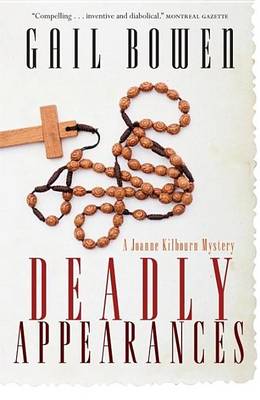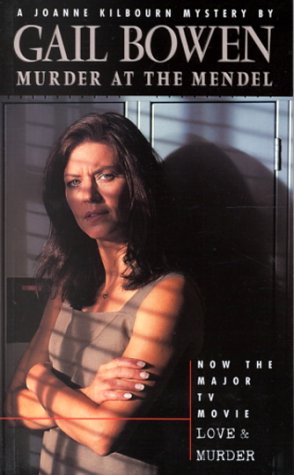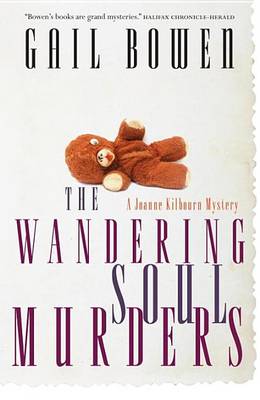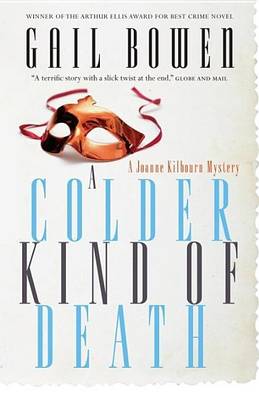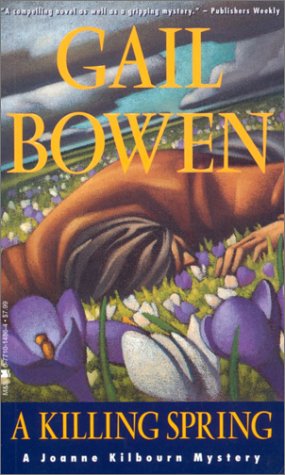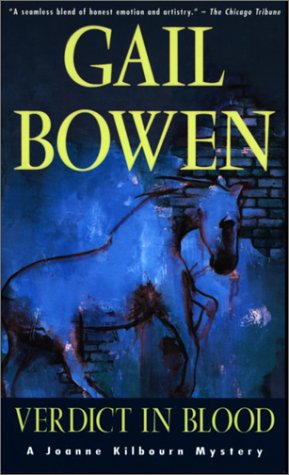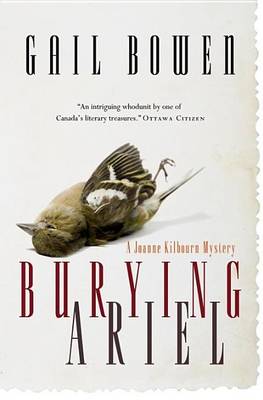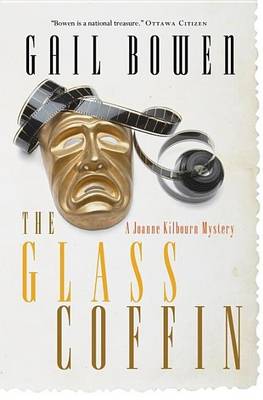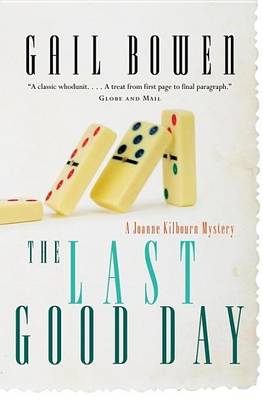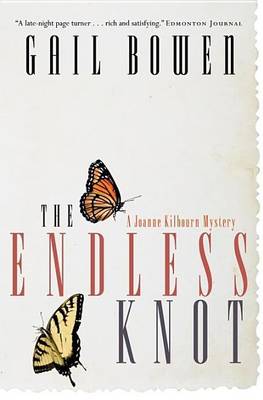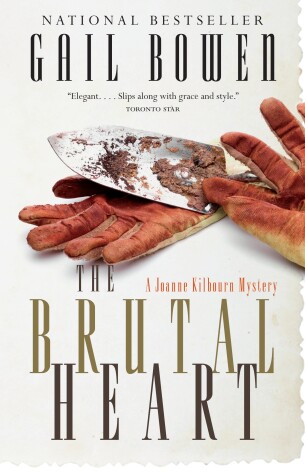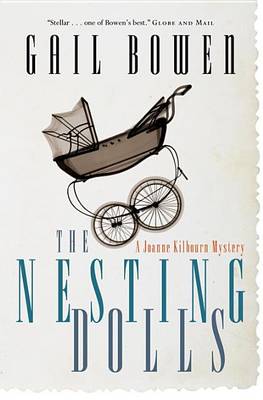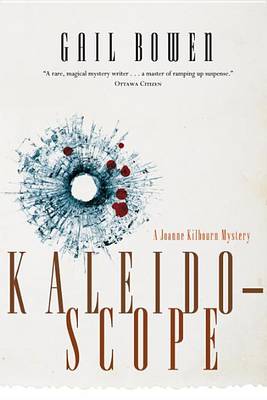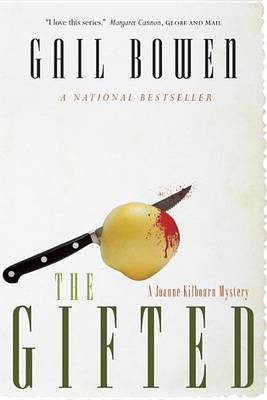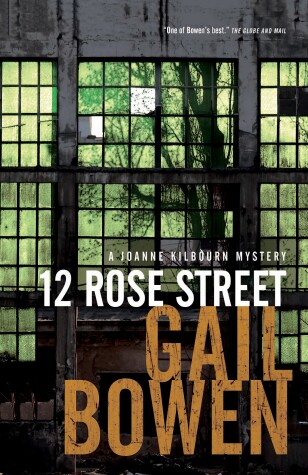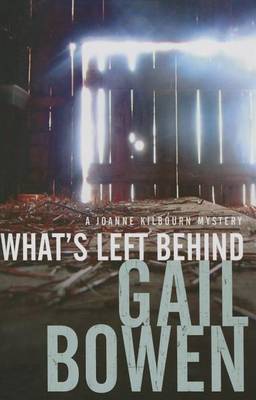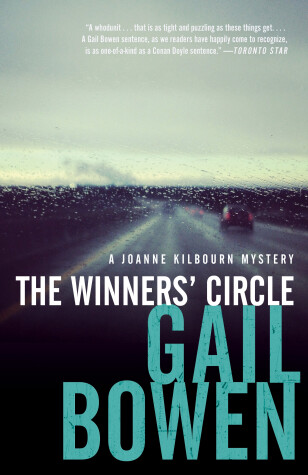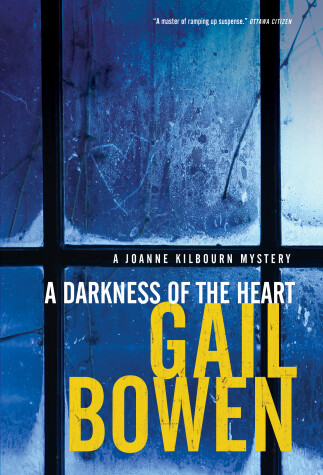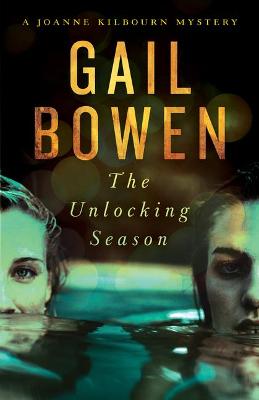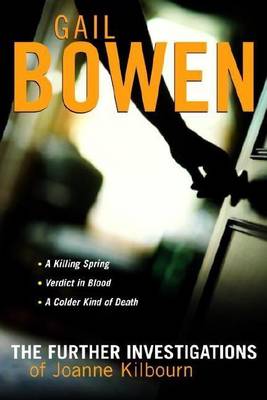Joanne Kilbourn Mystery
19 primary works • 24 total works
Book 1
Book 2
Book 3
Joanne is stunned and saddened by the news that the dead woman, at seventeen, was already a veteran of the streets. When, just twenty-four hours later, her son’s girlfriend is found dead, drowned in a lake in Saskatchewan’s Qu’Appelle Valley, Joanne’s sunny world is shattered. Her excitement about Mieka’s upcoming marriage, her involvement in the biography she is writing, even her pleasure at her return to Regina all fade as she finds herself drawn into a twilight world where money can buy anything and there are always people willing to pay.
Book 4
The haunting takes on a more menacing cast several days later when Tarpley’s sinister wife, Maureen, is discovered dead in a snow-swept Regina parking lot. A brightly coloured scarf is found wound tightly around her neck, a scarf that belongs to none other than Joanne Kilbourn. Soon this single mother, author, university professor, and TV-show panelist is deemed the “number one” suspect in Maureen Tarpley’s demise.
Joanne knows there has to be a connection between these two murders. But what is it? A cryptic letter sent to Joanne by Kevin Tarpley just days before his death intimates that Ian Kilbourn’s killing may not have been as senseless as first assumed. In fact, there are hints that some of Ian’s political colleagues may have been involved. But how deeply and in what way?
Then there’s the faded photograph of a pretty young woman and her baby that Joanne finds tucked in the wallet of her dead husband. Does it offer any clue to Ian’s murder, or to the deaths of the Tarpleys? Warily, Joanne Kilbourn is forced to follow a tangled trail deep into a heartbreaking past she never knew existed.
A Colder Kind of Death is the fourth novel featuring Gail Bowen’s “reluctant sleuth,” Joanne Kilbourn. With its deft mix of wry humour and mayhem, closely observed family scenes and gripping suspense, warm characterization and betrayal, it confirms Gail Bowen’s stature as one of the greats of mystery fiction.
Book 5
In the horrifying opening paragraph of A Killing Spring, Reed Gallagher, the head of the School of Journalism at the university where Joanne Kilbourn teaches, is found dead in a seedy rooming house. He is dressed in women’s lingerie, with an electric cord around his neck. Suicide, the police say. A clear case of accidental suicide. But for Joanne, who takes on the thankless task of breaking the news to Gallagher’s wife, this death is just the first in a series of misfortunes that rock her life, both professional and personal.
A few days after Gallagher’s death, the School of Journalism is vandalized – its offices and computers are trashed, and homophobic graffiti are sprayed everywhere. Then an unattractive and unpopular journalism student in Joanne’s politics class stops coming to school after complaining to an unbelieving Joanne that she’s being sexually harassed. Clearly, all is not as well at the university as Joanne had thought. Nor is all well in her love life after the casual racism of a stranger drives a wedge between Joanne and her lover, Inspector Alex Kequahtooway. To make matters worse, Joanne is unceremoniously fired by her best friend from the weekly political panel on Nationtv, which she’s being doing for years.
Badly shaken by these calamities, Joanne struggles to carry cheerfully on. Action, she knows, is better for her than moping. She decides to find out why her student has stopped coming to class, and in doing so, Joanne steps unknowingly into an on-campus world of fear and deceit and murder.
Book 6
In Verdict in Blood, Joanne’s good friend Hilda McCourt is visiting her in Regina, Saskatchewan, when Judge Justine Blackwell’s corpse is found sprawled across one of the limestone slabs of the Boy Scout memorial in Wascana Park. Blackwell, known for the harsh sentences she’s handed down over the years, had lately been seeking out people she’d once incarcerated and trying to help them. Had she had a genuine change of heart, or had she been getting senile? Even the fearsome judge herself had wondered. Just the night before her death, she’d asked Hilda to make an assessment of her mental condition.
Now she’s dead, the matter is urgent: Which of her two wills should prevail – the one leaving everything to her daughters, including the famous sixties singer Lucy Blackwell, or the one leaving it all to Culhane House, a halfway house for ex-cons? Whoever stood to lose could be her murderer, and Hilda has to decide. Before too long, Joanne (who has problems enough of her own with her lover, Alex, and his troubled nephew, Eli) finds herself once again embroiled in intrigue.
Book 7
Ariel Warren was a popular lecturer among the students and staff, and her violent death shocks – and divides – Regina’s small and fractious academic community. Kevin Coyle, a professor earlier accused of sexual harassment, is convinced the murder is connected to his case, even as Ariel’s long-time lover, Charlie Dowhanuik, a radio talk-show host, seems to point the finger at himself in his on-air comments on the day of the murder.
Aghast at Charlie’s indiscretion, his father, Howard, asks his old friend Joanne for her help. But before Joanne has a chance to start searching for the truth, she is scorched by the white-hot anger of militant feminists on campus when a vigil for the dead woman turns ugly. Instead of a tribute to Ariel’s life, the vigil becomes an angry protest about violence against women. Some of the women there are certain they know who killed Ariel, and they are out for vengeance.
The everyday family problems and joys Joanne Kilbourn experiences as she solves baffling murder cases have endeared her to a growing number of fans, as have the television movies, starring Wendy Crewson as Joanne. The seventh novel in Gail Bowen’s much-loved series, Burying Ariel offers readers an imaginative, compassionate, and, above all, challenging mystery.
Book 8
Canada’s favourite sleuth, Joanne Kilbourn, is dismayed to learn who it is that her best friend, Jill Osiowy, is about to marry. Evan MacLeish may be a celebrated documentary filmmaker, but he’s a cold fish who not only has already lost two wives to suicide, but has exploited their lives – and deaths – by making acclaimed films about them. Not even Jill appears to be particularly fond of him, and Jo is appalled to learn that her friend is marrying Evan primarily to become stepmother to his teenaged daughter, Bryn. Even Bryn hates her father for having filmed her all of her short life. It’s obvious to Joanne that this is stony ground on which to found a marriage. What is not obvious is that it is about to get bloodsoaked.
Intelligent, sympathetic, and harder-edged than earlier novels in the Joanne Kilbourn series, The Glass Coffin is the work of a writer at the top of her form.
Book 9
Bowen’s depiction of this community of lawyers, each in his or her way now divorced from the ideals of justice and mercy that once motivated them all, is both compassionate and hard-nosed. There is Zack, the charming but controlling paraplegic; Blake and Lily, whose daughter, Gracie, struggles to keep her dignity as her parents’ marriage falls apart; Noah, who would rather practise carpentry than the law, and his wife, Delia, who is consumed by worry about the firm. The mounting stress among these lawyers is palpable as Joanne delves into their lives. And Joanne faces her own personal anxieties too when she discovers that her former lover, Inspector Alex Kequahtooway, is mixed up in what seems to be some very sordid legal business.
Book 10
When journalist Kathryn Morrissey’s sensational book on the lives of thirteen adult children of prominent Canadians is published, one of the parents, Sam Parker, is furious enough to take a pot shot at the author, grazing her shoulder. Charges are laid, and Joanne’s new beau, Zack Shreve, is hired by Parker as his defence counsel. At the trial, which Joanne is covering for NationTV, Shreve focuses the jury’s attention not on who shot whom, but on why — on the ethics governing the relationship between a journalist and her subject.
Morrissey’s betrayal of her subjects opens up questions about an even more serious betrayal — the betrayal of children by their parents. While everyone condemns Parker for taking a gun to Morrissey, no one can fault his defence of his only child, Glen, a transsexual. The mutual love and commitment between this father and child stands in stark contrast to the alienation between Howard Dowhaniuk, Saskatchewan’s former premier, and his son, Charlie.
On the day of the verdict, Morrissey is brutally murdered, and Joanne’s investigation quickly has her trying to unravel the endless knot of the relationship between parent and child.
A deeply affecting novel of trust and betrayal, The Endless Knot is a superb mystery by a virtuoso of the genre.
Book 11
With a general election just weeks away, Joanne Kilbourn is following the campaign of Ginny Monaghan, a woman who has her eyes set on the leadership of the federal Conservative Party and whose success depends, not so much on the election-day poll, but on the outcome of a custody battle she’s fighting with her ex. Joanne thinks this is perfect material for a TV program she’s putting together on women and party politics. Happy to be back in the political fray that used to be her life during her first marriage, Joanne is soon also glad of the distraction it provides. A local call girl has been murdered — a woman whose regular clientele included several of Regina’s most prominent lawyers, including — until he met Joanne — her own husband, Zach Shreve.
Her new marriage creaking under the strain of this revelation, Joanne throws herself into her project — and into finding out why the dead woman had started to threaten her clients with blackmail, an investigation that leads to the truth — and to death.
In The Brutal Heart, Bowen expertly mixes the ingredients of marriage, family, politics, and murder into a constantly surprising and compulsively readable story.
Book 12
Book 13
Book 14
Book 15
Joanne's husband Zack is the leading progressive candidate in a neck-and-neck race, with the existing mayor, for Regina's top job. The tough campaigning is well underway when a disturbing threat disrupts the celebration for the opening of the Racette-Hunter Centre -- a project Zack has been spearheading, intended to benefit the impoverished community of North Central Regina. Joanne soon realizes that sinister interests are working behind the scenes of the election, and another savage act makes clear that someone will stop at nothing to maintain the status quo.
The Shreve campaign perseveres, but when Zack's opponents share some shocking information about the past, the revelation sends Joanne reeling. As tensions around the election build, Joanne tries to hold herself together, keep her family intact, and get to the bottom of why a series of violent incidents, seemingly related to the mayoral race, all lead back to a mysterious property in North Central, 12 Rose Street.
A gripping novel about family and friendship, competition and betrayal, 12 Rose Street confirms why Gail Bowen is indeed the "queen of Canadian crime fiction" (Winnipeg Free Press).
Book 16
The latest novel in the Joanne Kilbourn Shreve series opens in the month of May, a time of beginnings when all things seem possible. Joanne's husband, Zack, recently elected mayor of Regina, is optimistic that he can garner the public support necessary to make Regina a city that works--not just for the few, but for the many. Their oldest son Peter is marrying Maisie Crawford, a woman as clever and forthright as she is lovely. Their lakeside wedding is a dream come true, but when a former lover of a member of the bridal party shows up, the dream becomes a nightmare. Before the bride's bouquet has wilted, there's an act of sickening cruelty; soon afterwards, there's a murder.
Devastated, Joanne and Zack search for answers. As it becomes increasingly unclear whether political agendas, shattered romance, or a secret buried deep in the past have motivated the crimes, the loyalties of the Shreve family are tested. A gripping mystery with a social conscience, this is a novel of high stakes and innocence lost.
Book 17
As Joanne Kilbourn-Shreve, her husband, Zack, and their soon-to-be seventeen-year-old daughter, Taylor, rush through the rain from their cottage to their car, the Thanksgiving weekend they just spent at the lake with Zack's law partners is already slipping away, burnished into memory as pleasantly as the hundreds of other weekends the Falconer-Shreve families have shared at Lawyers' Bay. Thoughts of the weekend past will now focus on the future and be prefaced by the words "next time."
Within weeks, a triple homicide will rip apart the lives of those related to the lawyers who, at the end of their first year in law school, only half-jokingly styled themselves "The Winners' Circle." Dazed by grief, Joanne will seek answers to an impossible question: "Why did they die?"
The facts behind the suicide of Christopher Altieri, known by his law partners as "the conscience of The Winners' Circle," appear to provide insights, but for Joanne those insights raise new, unsettling questions. Knitting this powerful narrative together is Joanne's unshakeable belief that the only thing worse than knowing is not knowing.
Book 18
When, at the age of sixty, Joanne learns that Douglas Ellard, the reserved general practitioner whom she had grown up believing to be her father was, in fact, the best friend of her biological father, the brilliant visual artist Desmond Love, she begins to question not just who she is but what factors play a role in shaping all of us and in making us who we really are. Joanne is offered the chance to revisit her family history, when writer Roy Brodnitz, author of The Happiest Girl, a Broadway mega-hit inspired by a Desmond Love painting, approaches her with the idea of making a mini-series about the close relationship between the Ellard and Love families. Brodnitz is in town working on the film adaptation of his Broadway hit, and he and his film company soon become a significant presence in the life of Joanne's family, with results that are both life-changing and menacing. When Joanne and Zack's eighteen-year-old daughter, Taylor Shreve, develops a close friendship with the seventeen-year-old actress starring in the movie, the Shreve family is exposed to the dark side of the film industry and they uncover disturbing truths about the handsome and talented people they have invited into their lives. A Darkness of the Heart explores the ways in which clear vision, generosity of spirit, and a willingness to love can combat the forces in our world that seek to encroach upon innocence. Once again, Gail Bowen's powerful storytelling, engaging characters, and page-turning plot reaffirm her place as one of the finest mystery writers around.
Book 19
